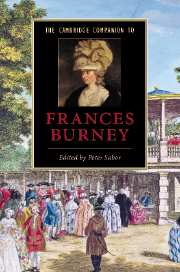Book contents
- Frontmatter
- Introduction
- 1 The Burney family
- 2 Evelina and Cecilia
- 3 Camilla and The Wanderer
- 4 Burney as dramatist
- 5 Journals and letters
- 6 Burney and politics
- 7 Burney and gender
- 8 Burney and society
- 9 Burney and the literary marketplace
- 10 The afterlife and further reading
- Further reading
- Index
- Series List
4 - Burney as dramatist
Published online by Cambridge University Press: 28 September 2007
- Frontmatter
- Introduction
- 1 The Burney family
- 2 Evelina and Cecilia
- 3 Camilla and The Wanderer
- 4 Burney as dramatist
- 5 Journals and letters
- 6 Burney and politics
- 7 Burney and gender
- 8 Burney and society
- 9 Burney and the literary marketplace
- 10 The afterlife and further reading
- Further reading
- Index
- Series List
Summary
When a significant body of work by a major author emerges from obscurity, scholarship and dissemination follow a fairly predictable trajectory. The first wave, necessarily biographical and bibliographical, places the material within the author's life and career and makes it accessible through careful editorial work. Burney's plays have been fortunate in this regard: the plays first came to our attention through the work of Joyce Hemlow, whose deep knowledge of Burney contextualised them within her biography and literary corpus. Hemlow's 'Fanny Burney: Playwright' and her subsequent The History of Fanny Burney described the manuscripts, summarised the plots, connected them to Burney's personal literary life, and initiated a scholarly focus on Burney's dramatic output. When Margaret Anne Doody took up the plays in her literary biography of Burney, she gave them the kind of serious consideration that ensured that they would never again be relegated to the margins of Burney's work. Uncovering in them innovative techniques, acerbic social commentary and a rich source of information on Burney's growth as an artist, Doody makes the plays full partners with the better known novels and journals.
Recent scholarship has continued the ground-breaking work of Hemlow and Doody. Barbara Darby, in the only book dealing wholly with Burney's plays, reads them from a feminist perspective, arguing that all the plays represent the oppression of women by male-dominated institutions and practices, whether in the political conflicts depicted in the tragedies or in the domestic discords enacted in the comedies.
- Type
- Chapter
- Information
- The Cambridge Companion to Frances Burney , pp. 55 - 74Publisher: Cambridge University PressPrint publication year: 2007
- 1
- Cited by



